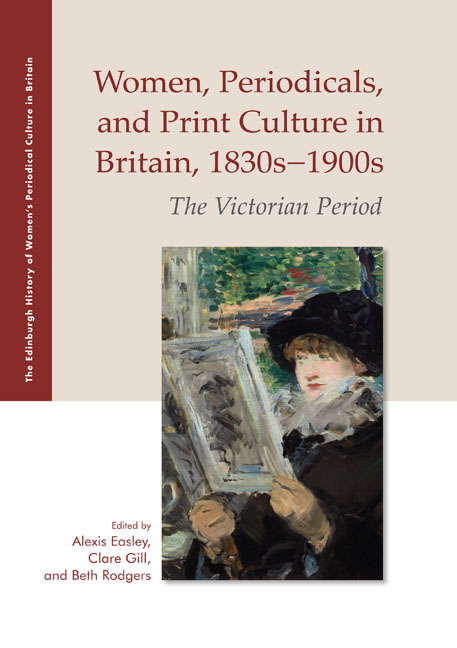Book contents
- Frontmatter
- Contents
- List of Illustrations
- Acknowledgments
- Introduction: Women, Periodicals, and Print Culture in the Victorian Period
- Part I (Re)Imagining Domestic Life
- Part II Constructing Modern Girls and Young Women
- Part III Women and Visual Culture
- Part IV Making Space for Women
- Part V Constructing Women Readers and Writers
- Part VI Intervening in Political Debates
- Intervening in Political Debates: Introduction
- 30 Brewing Storms of War, Slavery, and Imperialism: Harriet Martineau's Engagement with the Periodical Press
- 31 Mary Smith (1822–1889): A Radical Journalist under Many Guises
- 32 In Time of Disturbance: Political Dissonance and Subversion in Violet Fane's Contributions to the Lady's Realm
- 33 ‘Our Women in Journalism’: African-American Women Journalists and the Circulation of News
- 34 The Response of the Late Victorian Feminist Press to Same-Sex Desire Controversies
- 35 Wings and the Woman's Signal: Reputation and Respectability in Women's Temperance Periodicals, 1892–1899
- Notes on Contributors
- Index
- Plate section
31 - Mary Smith (1822–1889): A Radical Journalist under Many Guises
from Part VI - Intervening in Political Debates
Published online by Cambridge University Press: 25 October 2019
- Frontmatter
- Contents
- List of Illustrations
- Acknowledgments
- Introduction: Women, Periodicals, and Print Culture in the Victorian Period
- Part I (Re)Imagining Domestic Life
- Part II Constructing Modern Girls and Young Women
- Part III Women and Visual Culture
- Part IV Making Space for Women
- Part V Constructing Women Readers and Writers
- Part VI Intervening in Political Debates
- Intervening in Political Debates: Introduction
- 30 Brewing Storms of War, Slavery, and Imperialism: Harriet Martineau's Engagement with the Periodical Press
- 31 Mary Smith (1822–1889): A Radical Journalist under Many Guises
- 32 In Time of Disturbance: Political Dissonance and Subversion in Violet Fane's Contributions to the Lady's Realm
- 33 ‘Our Women in Journalism’: African-American Women Journalists and the Circulation of News
- 34 The Response of the Late Victorian Feminist Press to Same-Sex Desire Controversies
- 35 Wings and the Woman's Signal: Reputation and Respectability in Women's Temperance Periodicals, 1892–1899
- Notes on Contributors
- Index
- Plate section
Summary
MARY SMITH (1822–89) WAS a Carlisle-based poet and autobiographer whose posthumous The Autobiography of Mary Smith, Schoolmistress and Nonconformist (1892) is arguably one of the finest intellectual memoirs written by a Victorian woman. In its attention to religious and political ideas and extended introspection, Smith's account resembles such better-known Victorian middle-class intellectual autobiographies as those of Harriet Martineau or John Stuart Mill. Largely self-taught and from a lower-middle-class family ‘of the order of the common people, without any pretension whatever to wealth or rank’ (Smith 1892: 1), Smith became a poet, proprietress of a respected school, and active contributor to educational and reformist causes, among them campaigns for women's suffrage and against the Contagious Diseases Acts.
In addition, these endeavours were supplemented by four decades of dedicated, unpaid journalism, extending from the late 1840s until shortly before her death in 1889. Smith's contributions to journalism and public debate have received little notice, however, as she suffered the marginal status accorded an unpaid woman writer whose contributions were largely anonymous, disguised under pseudonyms, or consigned to the ‘Letters to Correspondents’ sections of the newspaper. Nonetheless, although abstemious and self-denying in person, in her periodical essays Smith wielded a bold and sharply critical pen in support of such causes as religious pluralism, training schools for poor women, women's right to vote, Irish Home Rule, and an end to imperialist wars. The introspective nature of Smith's Autobiography, moreover, provides a fuller insight into the motivations for her journalism than is commonly available for less-recognised women writers.
In their introduction to Researching the Nineteenth-Century Periodical Press: Case Studies (2018), editors Alexis Easley, Andrew King, and John Morton note the many impediments to tracing Victorian women journalists through the vast mass of unindexed or imperfectly indexed Victorian newspapers and periodicals. The effort to locate Smith's journalism would seem to provide a compendium of such impediments: she kept no list of her writings, which were scattered in at least eight separate publications, some no longer extant, and a significant proportion of her journalism was apparently anonymous and thus largely untraceable.
- Type
- Chapter
- Information
- Women, Periodicals and Print Culture in Britain, 1830s–1900sThe Victorian Period, pp. 502 - 515Publisher: Edinburgh University PressPrint publication year: 2019



